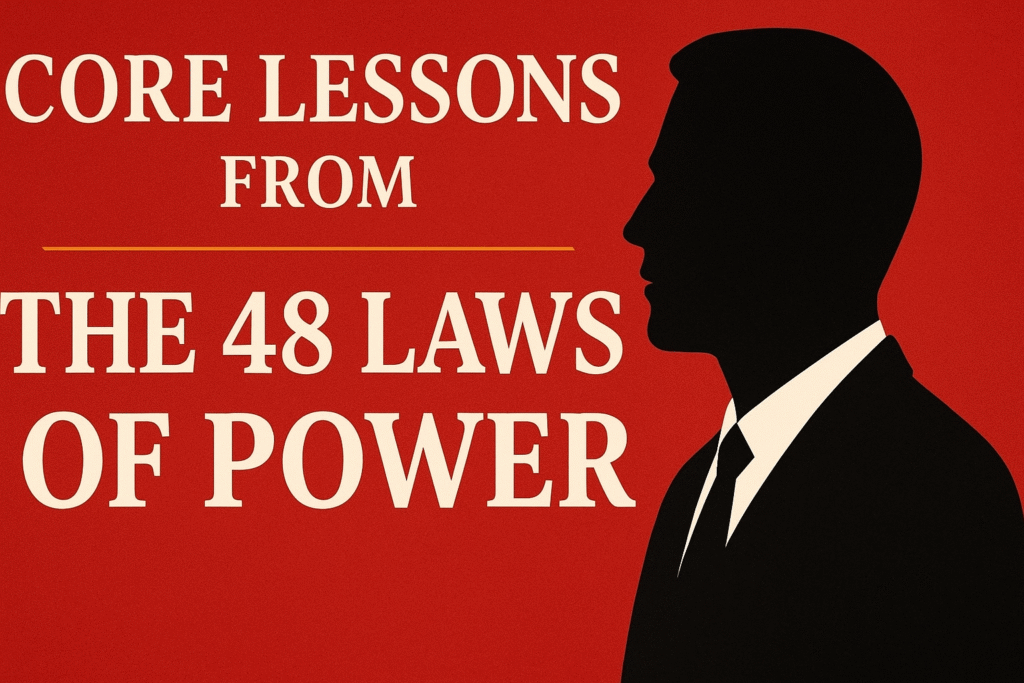Robert Greene’s The 48 Laws of Power has become one of the most influential books on strategy, psychology, and leadership. Loved by some and criticized by others, it is not a moral guide but a manual on how power works in real life—whether in politics, business, or personal relationships.
Here are the core lessons drawn from the book, organized into themes for easier understanding.
1. Power is About Perception
-
Law 1: Never outshine the master → Don’t make superiors feel insecure; instead, let them shine.
-
Law 6: Court attention at all costs → Being visible often matters more than being talented.
Takeaway: People rarely judge power by merit alone. Influence depends heavily on how you’re perceived.
2. Control is Subtle
-
Law 3: Conceal your intentions → Keep your strategies hidden until the right moment.
-
Law 4: Always say less than necessary → Mystery inspires respect and curiosity.
Takeaway: Silence and subtlety can be more powerful than words.
3. Timing and Patience Matter
-
Law 15: Crush your enemy totally → Half measures leave room for retaliation.
-
Law 35: Master the art of timing → Knowing when to act is as important as knowing what to do.
Takeaway: Success requires striking at the right moment—and finishing decisively.
4. Power Relies on People
-
Law 11: Learn to keep people dependent on you → The more irreplaceable you are, the more leverage you gain.
-
Law 20: Do not commit to anyone → Stay flexible; alliances shift quickly.
Takeaway: Relationships should be built with strategy, not just emotion.
5. Reputation is Everything
-
Law 5: Guard your reputation with your life → Reputation is a shield and a weapon.
-
Law 26: Keep your hands clean → Let others handle the dirty work while you remain untarnished.
Takeaway: In many cases, your name carries more power than your abilities.
6. Appearances Can Outweigh Reality
-
Law 34: Be royal in your fashion → Confidence and dignity inspire respect.
-
Law 38: Think as you like but behave like others → Fit in outwardly, while keeping independence inside.
Takeaway: How you carry yourself often matters more than who you really are.
7. Master Human Psychology
-
Law 33: Discover each man’s thumbscrew → Everyone has a weakness.
-
Law 44: Disarm and infuriate with the mirror effect → Reflecting others’ behavior unsettles them.
Takeaway: Understanding people’s motivations and weaknesses is key to influence.
8. Discipline Over Emotion
-
Law 36: Disdain what you cannot have → Ignoring what’s out of reach gives you strength.
-
Law 40: Despise the free lunch → Pay for what you value to maintain independence.
Takeaway: Emotional control and self-reliance protect your power.
Final Thoughts
The 48 Laws of Power is not a moral compass—it’s a survival guide in environments where competition, ambition, and human psychology shape outcomes.
-
If you read it with wisdom, it can sharpen your awareness of how others seek influence.
-
If you apply it carelessly, it can make you manipulative and distrusted.
Ultimately, the core lesson is this: power is a game of perception, timing, and human nature—and the best players understand both the strategies of Greene and the ethics of integrity.

